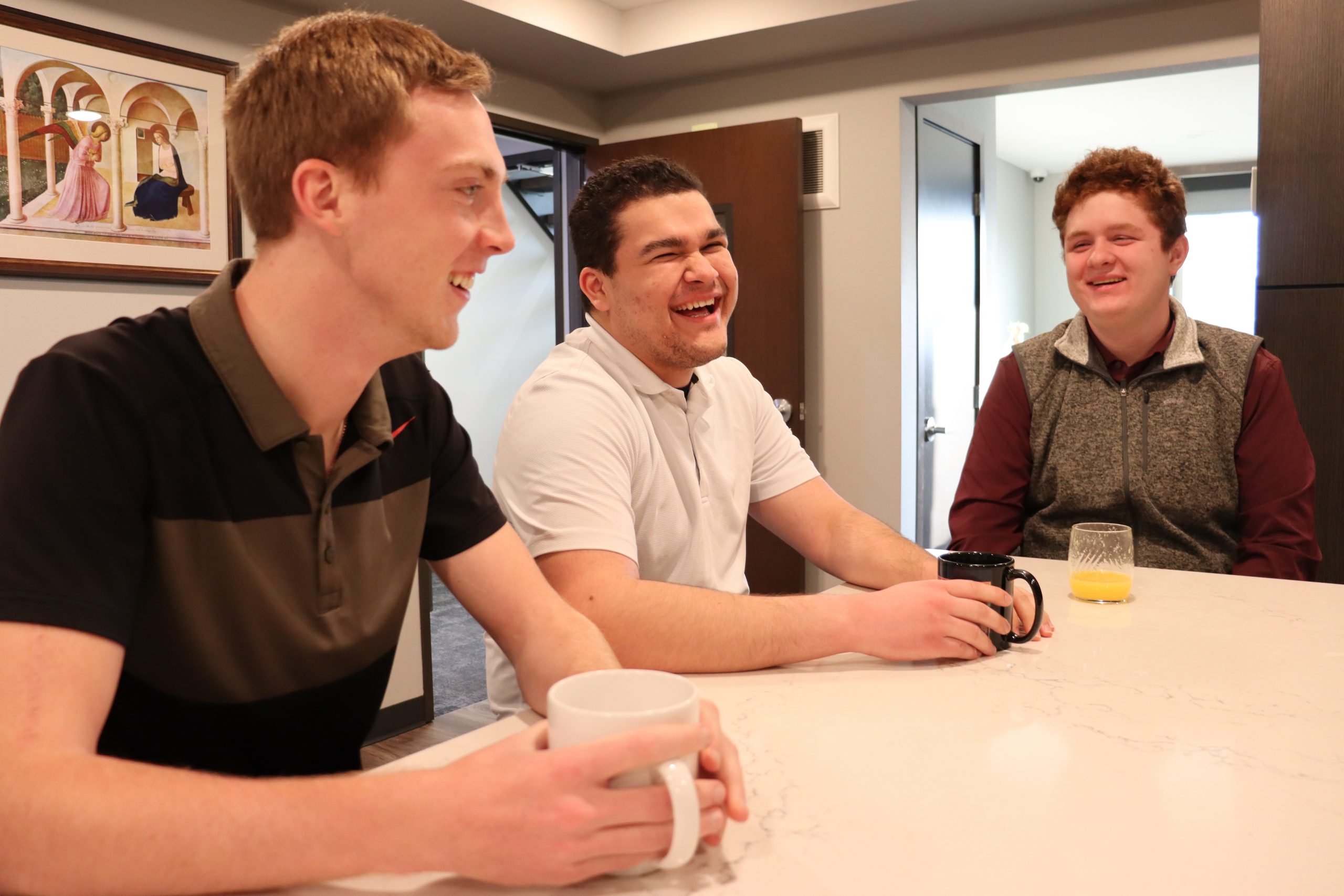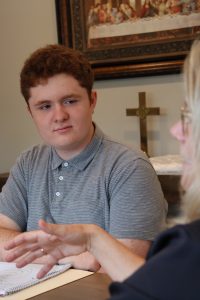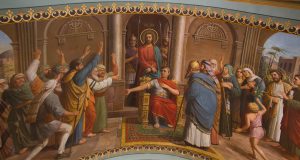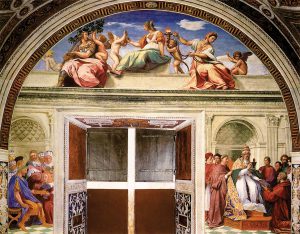
By Renae Kranz
What constitutes a family?
We’ve all experienced in our own lives that a family can be more than just immediate relatives. When we grew up and left home, we formed bonds with others who entered our lives and created new “families” that usually found their center around a place, idea, activity or person. Some of these families were healthy and good, while others were less so. Families that are healthy and good have something in common: they support one another.
The Diocese of Sioux Falls is our large family and community of faith, which works to unite the Catholics in eastern South Dakota into a family of God as part of the universal Church. What is the tie that binds us together? The love of God.
Relying on God’s love, we help each other grow closer to our Lord and become the holy people we are meant to be. We support each other with prayer, sacrifice, encouragement, emotional support and often a helping hand. And one of the ways we as a diocesan family support each other is through the Catholic Family Sharing Appeal.
It’s exciting to see the close ties formed in the various families of faith and how those ties are igniting pockets of blazing faith around the diocese. We took some time to visit two of those families of faith, the Nazareth House (home of the men in their propaedeutic, or first year, of formation) and the St. Thomas More Newman Center on the University of South Dakota campus in Vermillion, to find out how the gifts offered through the Catholic Family Sharing Appeal impact these young Catholics.
The Nazareth House
Four men and two priests call the Nazareth House their home. Father Michael Kapperman, vocations and propaedeutic formation director, and Father Tony Klein, vocations advocate, live in the house with the four men. It’s a time when these men focus on prayer and human formation to ensure a firm foundation before they continue on to seminary, if God continues to call them.
Father Kapperman says the propaedeutic year is a time for the men to become rooted in their relationship with God and come to know themselves, and the importance of being able to do that while living in their own diocese is critical.
“It’s helpful for the man’s discernment that he gets to know the diocese,” Father Kapperman says. “And it’s helpful for the diocese to get to know the man.”
The four men can have an enormous impact on the young people they encounter, and Father Kapperman says they express a great desire to do just that—to “engage in the life of the diocese.”
“They not only will write letters back and forth with students who are Catholic school students, but they’ve even manifest desires to go down and visit them,” Father Kapperman said. “It’s been a great gift having them in the house here. I get to see the ways that they fall in love with the people in the Diocese of Sioux Falls.”

The men who live in this house and receive formation will make the people in the diocese their family, people they want to care for and already love. They also become a mini family, as brothers traveling the same path together.
Ben Ulin, a Sioux Falls native and Catholic school alum, has settled in at the Nazareth House and sees the other men there as brothers in faith and the year in the propaedeutic house as a profound gift from the people of the diocese and from the Lord.
“[It has] allowed me to grow and to continue to discern,” Ben says. “So that’s honestly been such a grace and such a gift for me. It’s been really formative, a lot of really grace-filled times of prayer. And getting to go out and see all the different parishes and the schools especially has been really impactful for me, seeing all the youth at different points in their faith.”
Deciding to explore a call to the priesthood was not without its challenging moments for Ben. Besides watching his friends get acceptance letters for college, he was also worried about not having his family around.
“I was the oldest of five children, and we were really close as a family and did everything together,” Ben said. “We’d all get home from wherever we were, and we’d all sit on one couch together. Or we’d go on road trips where we’d drive for 17 hours straight, and that was just normal for us. So, I really like being with my family. And I was like, if I go off to seminary, am I gonna be lonely? Am I gonna ever have a family in a
sense?
“The really beautiful thing of just even being in the house here, but also doing Lumen Christi over the summers, was just growing to see how the Lord would provide for me and how he would always put people in my life that I could be with, whether it was my teammates over the summer or the three other brothers I have now and the two priests that we have here living with us,” Ben continued.
Living at the Nazareth House has helped Ben in his discernment a great deal so far. He and the other men often host other priests and lay faithful from the surrounding area for dinner. Seeing the fraternity among the priests has been especially impactful. That interaction and the benefit of staying in the diocese has meant a lot to Ben.

“Having the space that we have here to really grow in prayer, but then also in our understanding of who we are, who God’s made us to be and his desires for us,” Ben said. “And that’s just one of the really beautiful things about the propaedeutic year is there’s such a strong emphasis on growing spiritually, but then also growing as a person.”
The dollars shared by the people of the diocese through the Catholic Family Sharing Appeal help support the men who live at the Nazareth House. It allows them to focus on their formation without worrying about needing to find ways to make money to support themselves. That singular focus on discernment and formation has been an important component of Ben’s experience, and he’s grateful for the blessing.
“I can go about all my formation without needing to worry about whether or not my bank account’s gonna run out before the end of seminary,” Ben said. “I’m able to just focus solely on growing as the man that God desires for me, wherever that might lead me. I’m just so thankful that people are willing to provide for us.”
Father Kapperman reminds us that without priests, we won’t have the sacraments, so it’s up to all of us to support our priests and seminarians, and to “ask the Lord of the harvest to send out laborers for his harvest.”
“Financially giving to vocations allows men freedom to discern, because on average, the cost of a man in seminary is about $50,000 a year,” Father Kapperman said. “If we were to ask a young man to take that much debt on himself, he would never be able to pay it off. And so, by people donating to CFSA, what they can allow is a man to be able to freely discern, and not worry about taking on debt just to ask the question, ‘Is God calling you to be a priest?’”
St. Thomas More Newman Center
Father John Rutten, priest director of the St. Thomas More Newman Center, says Newman centers are places for students to connect, meet friends and form new families of young Catholics on college campuses. Many students come at first looking for a friend but soon find much more: a relationship with Jesus.
“Friendship with another is friendship with Christ, and you begin to grow in your awareness that he is the one that is calling me into friendship,” Father Rutten said. “Here you’re able to really say, ‘Okay, I don’t know what this means,’ and you don’t feel outcast because everybody’s kind of asking that question.”
Because there are missionaries on campus walking with the students, Father Rutten says the students “see a witness of what it looks like to grow in faith.” It’s a mission field well-equipped to serve the Catholics, Protestants, agnostics and others as they seek the deepest questions in their hearts.
“People are asking the question about the role of faith, and there’s an easy way for them to begin that journey on their own accord,” Father Rutten said about why students come there. “And I find young people today are open, they’re like, ‘What’s your proposal? What’s your thing?’”
The students are often surprised that they desire to come back and soon find a community they didn’t know they wanted to be a part of.
“They’re experiencing that the Gospel can be communicated to me, and my life can come alive and find meaning in ways because a man or a woman who’s not a religious or ordained found interest in me,” Father Rutten said. “As they grow and they become aware, they get opportunities to see how God wants to use them.”
Although the priest is important, he is not the one doing most of the evangelizing here. The students are becoming missionary disciples; the diocesan vision is a reality at the Newman Center.
“You have a student at a place where if their life has changed here, it’s changed lifelong,” Father Rutten said. “The only thing that’s happening here is missionary discipleship, and through God’s love is the only thing that moves everything. People of today do not feel obligated. If the love of Jesus Christ wasn’t the center of what was happening here, it couldn’t happen.”
One student who has felt that missionary discipleship mentality first hand is sophomore Taylor Schroeder, a medical biology major from Alexandria. Easy access to the sacraments right on campus, coupled with new virtuous friendships with others has helped her grow in her faith.

“We’ll be studying in a library and someone will say, ‘Hey, I’m going to Mass,’ and six of us get up and go to daily Mass together,” Taylor said. “I never pictured that for me in my college experience, but I’m really grateful for that. It’s also helped me to grow in my personal relationship with the Lord, because I didn’t really know what that looked like until coming here, but being able to experience that and see the ways that other people are living out their faith and how the Lord is working in them helps you to recognize the little ways that he’s working in your own life, too. And that’s been really meaningful for me.”
Taylor says the Newman Center has become the biggest part of her life. It’s changed her and those around her, and others notice and want the same thing. It now flows into all aspects of her life.
“I feel like I can’t go anywhere without knowing and understanding the mission and knowing that I’m loved, knowing that I wanna share that with people,” Taylor said.
Because of the receptivity of college students, Taylor sees this time in her life as an opportune time to be formed. As she and other students figure out how to live on their own, they also have the opportunity to incorporate their faith deeply into the new families they form. None of it could happen without the support of donations from her fellow Catholics through the Catholic Family Sharing Appeal.
“The support allows us to have this beautiful space and areas where every night of the week there’s a Bible study going on and places for people to come into and share life together,” Taylor said. “You might not necessarily see the fruits firsthand of what your donation actually means to a student here, but for me, I don’t know where I would be if I didn’t have this place.”
Father Rutten agrees, saying those funds account for about a quarter of the budget that supports the Newman Center. Every dollar goes to something necessary and essential.
“[The money] really goes toward a period of time in life in which the students are most open,” Father Rutten said. “You want to invest in a college-age student at a Newman Center where they can begin this journey on their own. It is gonna pay dividends like you can’t believe.”
One faith, one family
As one family of Catholics in the Diocese of Sioux Falls, it’s up to us to walk with each other on our journey of faith, whether that journey is with a seminarian, a college student or a member of our own family. Our gifts matter to those impacted by them, but our prayers and our actions matter as well. Please continue to pray for our seminarians and college students. In addition to prayers, Father Kapperman has two other ways we can contribute to an increase in vocations: by encouraging and sharing.
“If there’s a young man in your parish that you see growing in the life of prayer, encourage him to consider priesthood. And you can actually share the name of a young man who you think should enter seminary. You can share it with your priest or with me or Father Tony Klein.”
Names can also be shared by visiting sfcatholic.org/vocations/discern.
And just in case you STILL aren’t convinced your CFSA dollars matter, here’s one last bit of testimony from Taylor about the impact of the Newman Center on her life.
“Growing up, I was like, ‘Oh yeah, I’ll go to daily Mass when I’m old and retired.’ But every night of the week when I’m available, I’m at daily Mass.”
That doesn’t happen without you. Thank you for your generous support.


